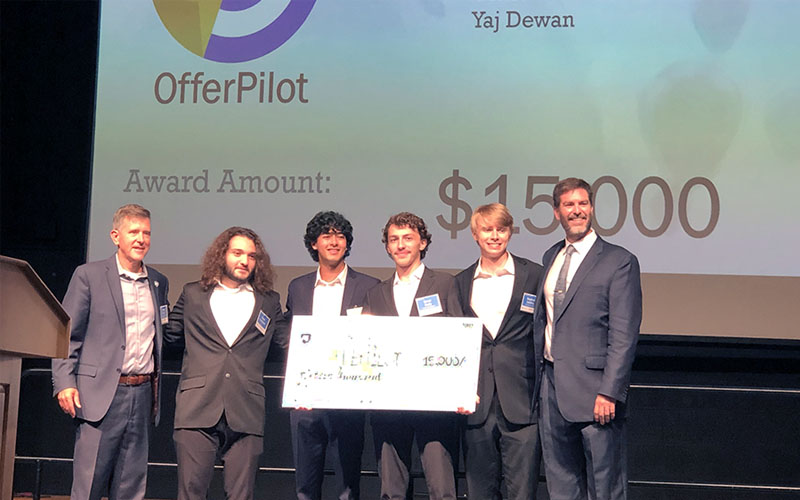By Chara Fitch
 Offer Pilot, winner of the 2023 Nittany AI Challenge.
Offer Pilot, winner of the 2023 Nittany AI Challenge.
The rise of artificial intelligence (AI) technology has created both excitement and uncertainty as users consider how to use it both effectively and ethically. At Penn State, nine student teams advanced to the final phase of Nittany AI Alliance’s eight-month competition, the Nittany AI Challenge, to use AI to promote change in real-world applications for the environment, health, education, and humanitarianism.
For eight months, the student-led teams used a $1,500 grant and support from the Nittany AI Alliance to build a minimal viable product (MVP) using AI technology. Each team was hand-selected from an initial pool of 60 competitors. The 2023 winner is Offer Pilot, technology that creates tailored resumes and cover letters based on an applicant’s experience and the specific position for which they are applying, formatted to pass the ATS screening.
Penn State is a great launch pad that has allowed us to meet so many people and give us access to a ton of resources.
According to the team’s presentation, 90% of Fortune 500 Companies use Applicant Tracking Systems (ATS) to manage high volumes of job applications. ATS electronically scans resumes, scores qualifications based on the job description, and ranks the applications. Seventy-five percent of candidates are “phased out of consideration” during this process. Offer Pilot helps students–especially first-generation college students–create resumes that pass this first stage of screening, helping candidates increase their chances of being hired..
Tackling issues from personal experience
The challenge gives teams the opportunity to draw on their personal experiences and create solutions for problems that, in some cases, they have witnessed firsthand. Sahil Kuwadia is the team lead for Oris, a software that uses AI technology to improve oral disease detection and classification in underserved communities. Kuwadia’s inspiration for creating the app originated from his grandfather’s own oral illness from poor access to healthcare in rural India. “[He] has suffered from a variety of oral diseases, from having dentures that had to get drilled into his jaw to parts of his gum decaying,” said Kuwadia. “Our goal is to democratize oral health care using artificial intelligence. Many people don’t have access to dentists, or a visit to one is too expensive unless absolutely necessary.”
Oris uses AI and 3D printing to scan the inside of a patient’s mouth to analyze for oral diseases such as gingivitis. The app then provides resources for how to reverse or prevent damage or refers them to a medical professional. “Maintaining oral health is crucial for overall well-being,” said Kuwadia, adding that children with good oral health even perform better in school. “Poor oral health can lead to a range of issues, including cavities, gum disease, bad breath, and even systemic health problems like heart disease and diabetes. Moreover, oral health impacts daily life, affecting speech, eating, and self-confidence.”
There’s both a huge student interest and a lot of support from the university fueling those student interests. This dynamic blend of widespread student enthusiasm and institutional support creates an environment where AI interests flourish.
Another team’s solution is designed to lift up underserved communities with career guidance. Achievify is a career trajectory and exploration tool that addresses the career education and attainment gap in minority and low-income groups. Stephanie Bowles, the team lead for the project, is inspired by her own experiences and challenges as a first-generation college student. “Given that my own journey has equipped me to mentor fellow community members, later in life I found myself repeatedly offering guidance to both adolescents and adults in my community on avenues to meaningful careers,” said Bowles. “It became evident that consolidating that sort of information into a comprehensive tool could exponentially benefit more individuals in the long run.”
The solution uses GPT-4 to develop an interactive web application to provide tailored career recommendations based on users’ interests and personal experience. “Our goal is to empower individuals by offering insights into various career paths, including alternatives to traditional higher education like trade schools,” said Bowles. “By simplifying complex information and presenting it in a user-friendly manner, we aim to help underserved communities make informed decisions about their futures.”
A catalyst for collaboration
Brad Zdenek, Innovation Strategist and Program Manager at Nittany AI Alliance, said, “Artificial Intelligence, and generative AI in particular, is a truly disruptive set of technologies, but their potential for impact and application must be understood if we are to capture this moment and move our commonwealth into the future.”
The Nittany AI Challenge is an important catalyst for student innovation and collaboration in AI. “Thanks to the challenge, I was able to meet an amazing group of talented students that not only share the same passion, but also have tremendous skills. Together, we’ve transformed the project into a scalable solution with practical implications for a broader local and global audience,” said Bowles.
“In the days, weeks, and months after the conclusion of the Challenge,” said Zdenek, “we will continue to support our teams in determining what the future may look like for their solutions, whether it be starting a business, sharing their solutions with the world freely, or moving down a research path to refine and study the impacts of their solutions.”
The environment at Penn State has been ideal for the students to pursue their passions. “Penn State is a great launch pad that has allowed us to meet so many people and give us access to a ton of resources,” said Kuwadia.
“There’s both a huge student interest and a lot of support from the university fueling those student interests,” said Bowles. “This dynamic blend of widespread student enthusiasm and institutional support creates an environment where AI interests flourish.”






